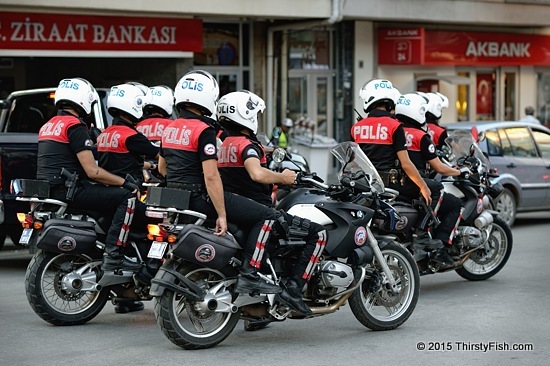Who Do They Work For?

Turkey recently passed a perilous "security bill" giving broad powers to police and prosecutors. The bill has been described as a threat to Turkish democracy.
In his book "Endgame", author Derrick Jensen writes: "The property of those higher on the hierarchy is more valuable than the lives of those below. It is acceptable for those above to increase the amount of property they control - in everyday language, to make money - by destroying or taking the lives of those below. This is called production. If those below damage the property of those above, those above may kill or otherwise destroy the lives of those below. This is called justice". I wouldn't word it quite like him, but that is a difficult argument to refute. There are countless examples of the property of the privileged being valued more than the lives of the underprivileged. Given that the privileged are a few compared to the less privileged, how is the hierarchy maintained?
The fall of East Germany in 1989 has been called the Peaceful Revolution. It was only "peaceful" because the 8,000 armed police officers and 5,000 plain-clothes infiltrators refused government orders to fire on the protestors. That was rare historical example. Historically, the privileged and their interests have been "protected" by security personnel, police forces and the military. When soldiers are sent to fight for "Vital American Interests", those "interests" are rarely in the interest of most Americans - they are for the benefit of the privileged...
Police and military forces are critical in maintaining security, stability and order in an increasingly complex world. I don't think anyone can deny that. But the fact is, they also protect the interests of corporations and banks, or more generally the privileged. It's not just one over the other, it's both. Naturally the privileged defend security personnel as essential, whereas the underprivileged generally mistrust them. And most, simply refrain from thinking about it, so long as they do not get targeted themselves:
- First they came for the Socialists, and I did not speak out - Because I was not a Socialist.
- Then they came for the Unionists, and I did not speak out - Because I was not a Unionist.
- Then they came for the Jews, and I did not speak out - Because I was not a Jew.
- Then they came for me - and there was no one left to speak for me.
- -- Martin Niemoller
Posted
- Tue 2015-02-24
Captured
- 2014-08-22
- Ankara, Turkey


